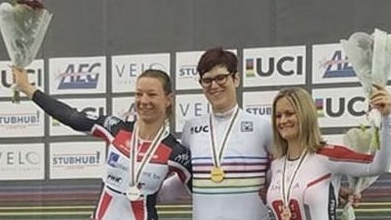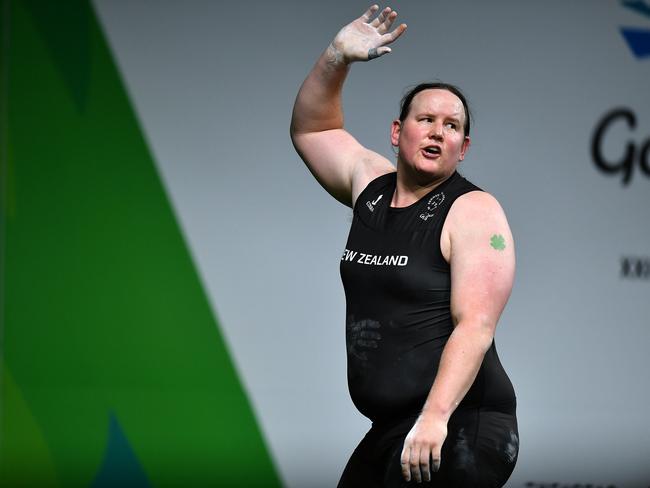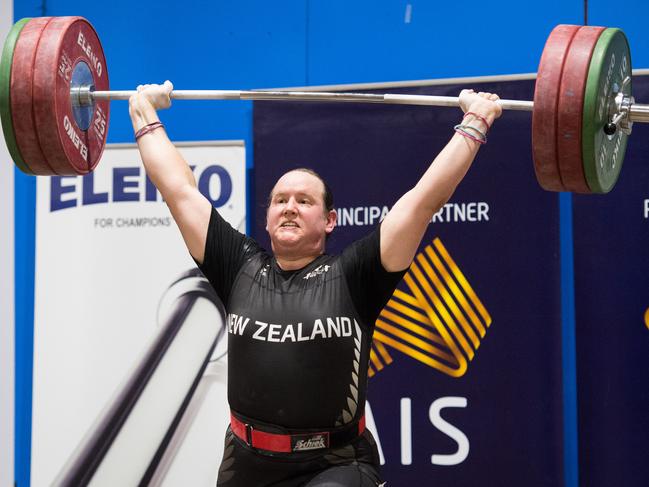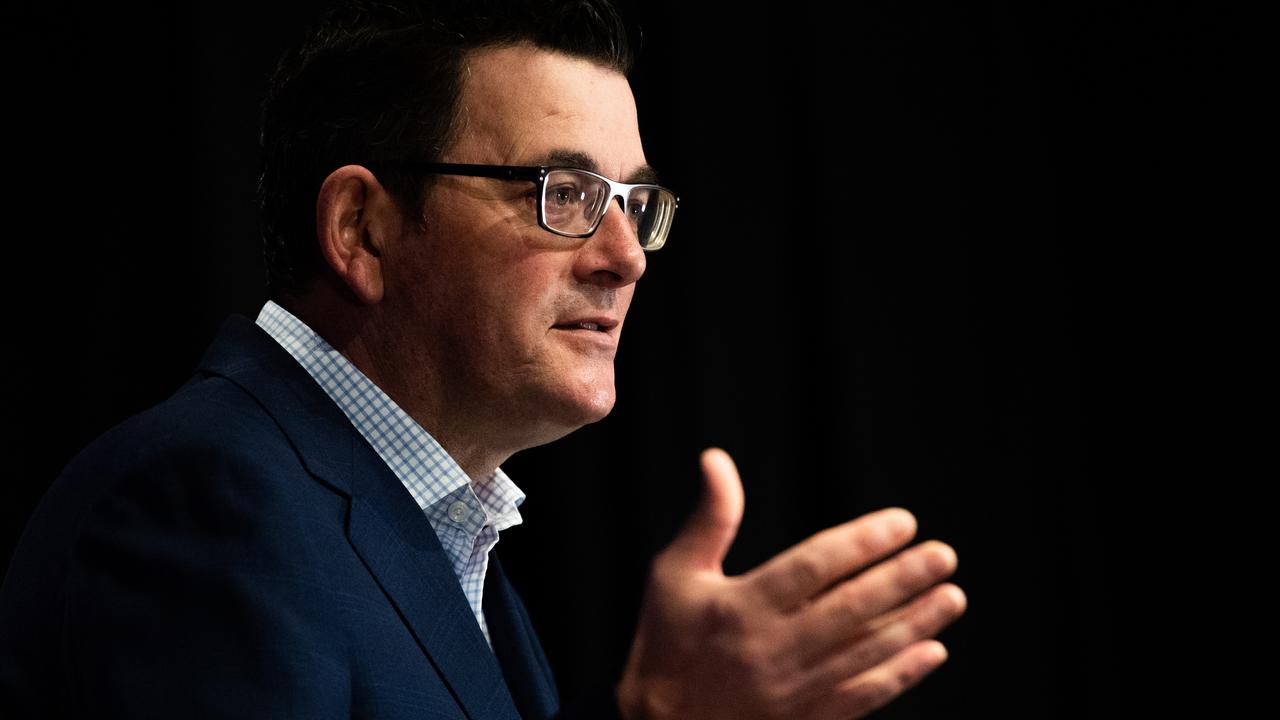Female athletes are right to be concerned about trans competitors, writes Rita Panahi
LAUREL Hubbard used to be Gavin and competed as a male weightlifter before transitioning and competing as a female. In her first major international competition last year she broke national records on her way to winning the women’s over-90kg division, writes Rita Panahi.

Rita Panahi
Don't miss out on the headlines from Rita Panahi. Followed categories will be added to My News.
IN this gender-fluid age of identity politics where feelings matter more than chromosomes, the fairer sex is being asked to accept athletes with an unfair advantage.
It’s hardly an avalanche but slowly female athletes who were born male are beginning to make their presence felt in elite sporting circles. Some compete without their former gender being disclosed while others are proudly, and some would say obviously, transgender.
A Canadian cyclist who identifies as female, Rachel McKinnon, last week won the 2018 UCI Masters track championships in Los Angeles.
MORE PANAHI: MORRISON MAKING RIGHT MOVE ON JERUSALEM
SENTENCED TO DEATH FOR A CUP OF WATER
WHY FORCING MIGRANTS OUT OF MELBOURNE WON’T WORK
McKinnon, a philosophy professor who calls herself an “internationally recognised expert on the science and ethics of transgender inclusion in sport”, took to Twitter to declare, “I can’t believe that I’m the first trans woman world champion” with a picture of her on the dais looking bigger and stronger than the CIS gender women who placed second and third.
She then called any criticism of her achievement “transphobic bigotry” and claimed that elevated testosterone levels and male body development don’t give her an unfair advantage. Indeed, McKinnon believes that testing transgender athletes’ testosterone levels violates their human rights.
“We cannot have a woman legally recognised as a trans woman in society and not be recognised that way in sports,” McKinnon said.
“Focusing on performance advantage is largely irrelevant because this is a rights issue. We shouldn’t be worried about trans people taking over the Olympics. We should be worried about their fairness and human rights instead.”
Predictably, there was a strong response on social media ranging from adulation and glowing media reports, to criticism from those who believe McKinnon had no business competing in a women’s competition. Among them was third placegetter Dr Jennifer Wagner who said it was neither fair nor right.
Professor Kathleen Stock, whom McKinnon labelled a “transphobic bigot”, pointed out that those born male enjoy certain physical advantages when it comes to athletic prowess.

“You beat a bunch of females, due to genetically endowed features none of them could hope to have,” Prof Stock tweeted.
Comedian Ricky Gervais also mocked the historic sporting moment, posting: “Yeah, she’s done well there. I’m sure all the women she beat will try even harder next year.” He added: “Women’s heavyweight boxing is gonna get f---ing interesting.”
Gervais has a point — there’s a reason why men and women have separate competitions. Men are faster, more powerful and have significantly higher levels of testosterone.
That doesn’t mean a competitor born male but identifying as a woman, and undergoing gender reassignment, doesn’t have to train hard to win but they go into any competition with a significant advantage. It is plainly unfair to expect women to be competitive against males in physical pursuits.
Who can forget the Williams sisters taking on the 203rd ranked male player Karsten Braasch who prepared for the match with a few drinks and cigarettes but still managed to beat Serena 6-1 and Venus 6-2 back when Venus was a top-five player.
MORE recently, the national women’s soccer side, the Matildas, lost 7-0 to an under-15 boys side from Newcastle in the lead-up to the Rio Games in 2016. Matildas coach Alen Stajcic responded to criticism of the result by explaining the disadvantage females face against males, even those under 15.
“At the end of the day, four of the seven goals scored last night were scored off crosses. If someone is half a foot or a foot taller than you, that’s an anatomical and a biomechanical thing and you can’t do anything about that.”

At this year’s Commonwealth Games on the Gold Coast, a “transgender ticking time bomb” was about to explode before New Zealand’s heavyweight weightlifter, Laurel Hubbard, succumbed to an elbow injury and had to withdraw just when it looked certain she’d win gold.
Hubbard used to be Gavin and competed internationally as a male before transitioning at the age of 35 and competing as a woman. Last year in Melbourne, she competed in her first major international competition and broke a number of national records on her way to winning the women’s over-90kg division. She was representing NZ after beating Olympic medallist Tracey Lambrechs who, after Hubbard’s rise, lost 17kg to compete at a lower weight division.
Before the Commonwealth Games, her participation caused an outcry from a number of weightlifting federations, including Samoa. “A man is a man and a woman is a woman and I know a lot of changes have gone through, but in the past, Laurel Hubbard used to be a male champion weightlifter,” said the Samoan head coach. “The strength is still there and I think it’s very unfair, and for all females it’s unfair.”

Of course, anyone who doesn’t embrace transgender athletes is subjected to all sorts of abuse.
New Zealand physiology professor Alison Heather believes transgender athletes have an unfair advantage, particularly given their elevated testosterone levels. The IOC allows transgender athletes to have testosterone levels up to 10 nanomoles per litre, significantly less than the average male but more than three times the level of the average women.
“The physiological attributes of males that makes them naturally stronger including anatomical and biological features such as size, muscle mass, lung capacity, and heart size would be an advantage,” said Heather, who has called for greater research to determine whether “it is a level playing field for CIS women versus trans women”.
It may be stating the bleeding obvious but men and women are different and pretending otherwise only disadvantages women.
Rita Panahi is a Herald Sun columnist.
MORE RITA PANAHI:


